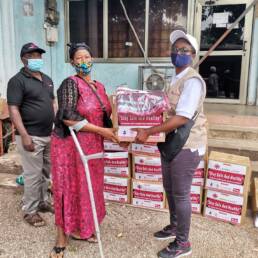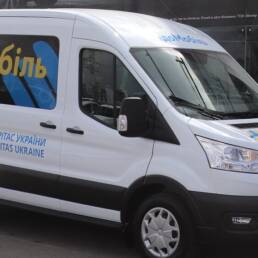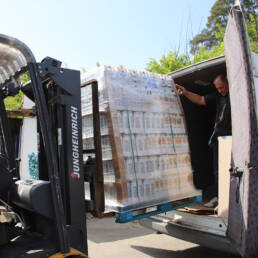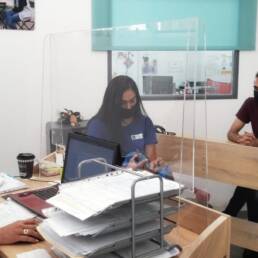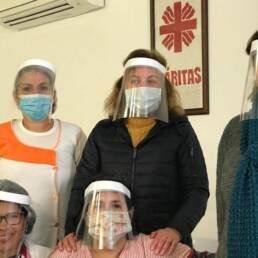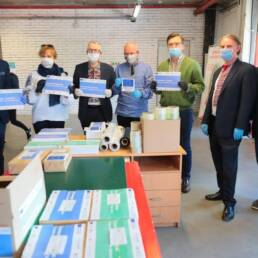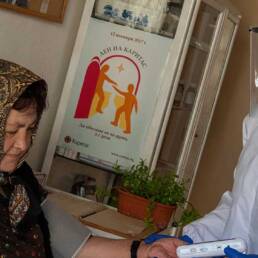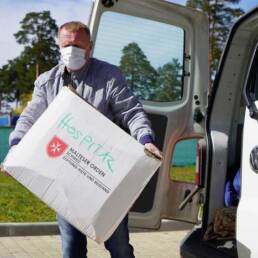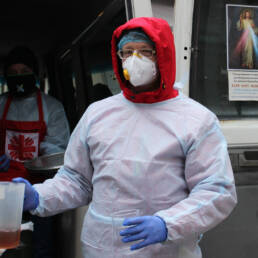Author
Caritas Italy
Caritas Italy
Tel: +39 06 66 17 71
segreteria@caritas.it
http://www.caritas.it
Often our staff has to work under difficult conditions.
We are struggling to sanitise our reception structures, to provide adequate structures for the isolation of beneficiaries who may be (potentially) infected, as well as to ensure asylum seekers and refugees still have a safe place to stay during these weeks of lockdown and social distancing. But while we have had to scale down our activities, I am very proud to say that our centres continue to work and are open to those who need them.
Oliviero Forti, Head of Migration Department, Caritas Italy
Since early March, Italy has been on almost complete lockdown. For Caritas in Italy, a network of organisations which caters to and supports the most vulnerable in society, the COVID-19 pandemic has raised several crucial questions. The most pressing one is about how to keep the organisation’s basic services running while guaranteeing the safety of its personnel and volunteers. But another one, equally important, is about the broader social, political and economic impact of COVID-19 on Caritas’ beneficiaries. Refugees, asylum seekers and migrants have been amongst the most severely hit by the current crisis.
Through its diocesan network at municipal and regional level, Caritas has long been working with migrants, refugees and asylum seekers. Caritas provides them with a variety of services, ranging from labour and healthcare orientation to legal aid and consultation, from Italian language classes to intercultural mediation. The networks’ general services to low-income and vulnerable populations, such as temporary accommodation, canteens and meal deliveries, are accessible to migrants as well (including undocumented). As part of a state-sponsored asylum programme, Caritas local organisations also manage various types of reception centres and housing facilities for asylum seekers, refugees and people in need of protection.
Facing COVID-19 and government confinement measures, Caritas in Italy has had to readjust its operations. There have been growing health and safety challenges, such as for example ensuring social distancing and quarantine measures in managed accommodations. Those concerns applied to Caritas staff themselves as the virus continued to spread, forcing local Caritas organisations to reduce their staff presence on the premises. The vulnerability of elderly people vis-à-vis the virus has also deeply impacted the network’s service provision capabilities, particularly since Italian retirees are the backbone of volunteering structures at the local level.
COVID-19 has changed the daily routine of the staff in a refugee reception centre. […] We are committed to supplying our guests with all they need to stay indoors 24/7. We spend hours preparing food shopping lists to avoid going back to the supermarket too often. Our guests show a great deal of understanding. They are ready to take, with a smile, products they did not ask for, while others wished they could help staff in doing the groceries.
Magda, staff at Caritas Lodi, Lombardy
In spite of the challenges, the Caritas network in Italy continues to support refugees and migrants across the country with extreme dedication. While masks and other protective equipment are not always easy to find, the surge in financial and in-kind donations – including homemade sewn masks – have made it possible to secure working conditions in housing and reception facilities. Across the country, Caritas organisations have switched to webinars, phone calls and digital brochures to continue delivering language classes, providing psychosocial support, raising health awareness and providing the latest information on residence permit renewals or healthcare access. Temporary accommodation programmes have also been expanded so that more people in need (including migrants) have a safe place to stay during the lockdown period. Caritas canteens, one of the cornerstones of its relief programme, continue to operate across the country, with some reducing capacity in compliance of social distancing measures and others opting for delivering only take-away meals. To offset the critical shortage in volunteers, Caritas organisations have also successfully launched several volunteering drives among Italian youths – the success of this initiative likely to be one of the long-lasting positive outcomes of the crisis.
When it comes to the conditions of migrants and refugees, the COVID-19 pandemic has laid bare a situation that was already problematic. Legislative changes enacted by the previous government in 2018 have since narrowed down the criteria for international protection eligibility. As a result, many asylum seekers have seen their protection requests denied, become overnight migrants in irregular situation and lost any type of government support, including housing. Soon after the COVID-19 outbreak, in order to avoid that people ineligible for protection would be thrown out of reception centres, becoming effectively homeless at such a critical time, Caritas Italy and other civil society organisations reached out to the government. Fortunately, the government listened to their request, granting current guests the right to stay in the centres at least until the end of the crisis. While refugees’ and asylum seekers’ immediate need was to maintain access to housing and shelter during the crisis, lockdown measures and confinement have also taken their psychological toll on the guests hosted in Caritas’ facilities.

COVID-19 is very difficult for everyone as we all have to stay at our own places for our safety. However, the problem becomes triple when living in a shared house, especially with flatmates who are not taking the situation seriously. My wife is under psychological treatment and suffering extremely from the noise that other flatmates make. Staying just in a small room all day and not being able to go out has been the worst situation we have ever experienced. Covid-19 has made our life like being in jail.
Abdul, guest at Caritas Lodi’s reception facilities
COVID-19, and particularly the Italian government’s related confinement measures, have also affected migrants’ ability to work. Recent reports have raised the alarm bell about the acute shortage of farm workers and the risk that fruits and vegetables rot in the fields unless a new recruitment scheme is put in place. According to some estimates, there is a shortage of approximately 250,000 seasonal workers. Observers have attributed this to the sudden departure of Romanian and Bulgarian seasonal workers (to their home countries) and to the newly enforced border barriers that are preventing Polish workers from reaching Italy. However, unmentioned in the public debate is the fact that migrants from non-EU countries already living in Italy – both undocumented and with regular resident permits – have long made up a substantial share of agricultural workers in the country.
But the lockdown measures put in place by the government, which require anyone to justify their movements based on sworn self-declarations and supporting documents from employers, have made it impossible for migrant workers to continue working in the fields. As explained by the staff of Caritas Italy, migrants are afraid to seek work or go to their job for fear of being apprehended at police check points, of potentially being fined hundreds of euros for being outdoors or even being detained. Undocumented migrants, who not only cannot show any proof of formal employment but also of valid government ID, are the most vulnerable in this situation. However, even migrants with regular resident permits are often employed informally, so they cannot provide valid justifications to the authorities.
COVID-19 has also impacted Caritas work outside of Italy, grounding its protection programmes to a halt. Since 2017, in collaboration with the Italian government, Caritas Italy has participated in the humanitarian corridors, a programme designed to ensure that people eligible for international protection can reach safe haven in Europe without having to embark on dangerous journeys through the Mediterranean. Thanks to this programme and Caritas’ diocesan reception network, hundreds of Eritrean, Somali and Syrian refugees (among others) have been (and will be) able to leave crowded refugee camps in Ethiopia or Jordan and find a new home in Italy. Early this year, Caritas Italy, in partnership with the local branch of the UNHCR, had just set up in Niger a humanitarian corridor programme to resettle asylum seekers evacuated from Libya. On 24 February, on the eve of the first departure of 66 refugees, the Italian government put the programme on hold judging it a health hazard as the virus was beginning to spread in Italy. This has left resettlement candidates stranded in Niamey, Niger’s capital.
Given this unexpected last-minute decision, the most challenging thing was to communicate refugees they would not be able to board the plane. These are people from Sudan, Cameroon, Togo and Syria who have suffered a lot and had a very difficult life. Some of them were evacuated from Libya, where they spent months, if not years, in detention centres in horrifying conditions. With the help of UNHCR we are in constant contact with the refugees, making sure they are taken care of and provided all the necessary support and kept informed.
Olivero Forti, Caritas Italy
Following government reassurances that this is just a temporary suspension linked to the pandemic, Caritas hopes to resume the programme as soon as possible. This is all the more important in view of other recent developments – such as the April 7 decision of the Italian government to declare its national ports unsafe due to COVID-19 – which have furthered limited access to asylum and protection in the country.


